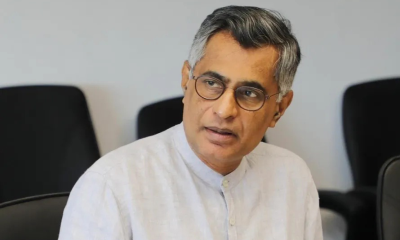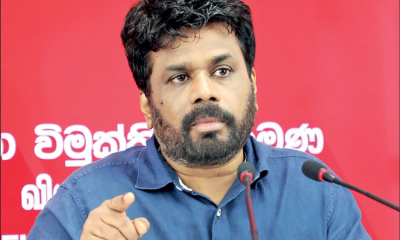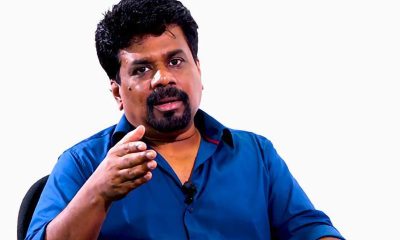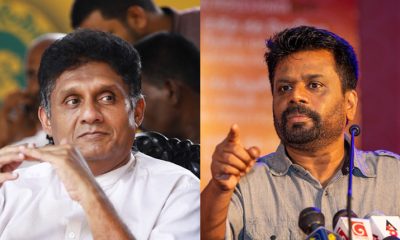Editorial
What will the New Year bring?

This being the last issue for 2023, we take the opportunity of wishing all our readers a very Happy New Year. But not even the most optimistic among us would say that all Sri Lanka’s troubles have been packed up in the old kit-bag and there is reason to “smile, smile, smile” as the New Year beckons. The aragalaya-fuelled trauma of the previous year that loaded the worst ever travails in our contemporary history on the backs of the people had, no doubt, tailed off in the year now passing.
But the end of miles-long fuel queues, ever present search for cooking gas and a host of woes that made 2022, the last months of the Gotabaya Rajapaksa presidency, and one that saw the banishing of the Rajapaksas to a perceived political wilderness did not play out this year as may have been expected. Many termites are now crawling out of the woodwork, looking at the elections that must be held next year.
The people are very well aware that the respite they won in 2023 was largely due to the country not servicing its debt and falling back on repayment of its domestic and international obligations. Although our rulers trumpet that inflation is down to a single digit, any housewife stepping into a market knows all too well that the cost of living is unbearable.
True, upscale restaurants and the big hotels are crowded by the affluent not lacking in this so-called democratic socialist republic of ours. That has always been the case given the grave income disparities that have beset this island before and after Independence. Our notorious penchant for ‘clean suit, empty pocket’ lifestyle has been widely on display with the capital city of a country that not long ago declared itself bankrupt when Colombo was lavishly decorated with power guzzling illuminations. And this while tens of thousands of domestic electrical connections have been disconnected due to non-settlement of bills.
We step into the New Year with trepidation knowing that with the increased value added tax (VAT) hard-pressed domestic budgets are going to be further burdened. A small carrot has been dangled before the people saying that the unseasonal rainfall of an unusual magnitude, enabling the Ceylon Electricity Board to generate much of the country’s power requirements with hydro resources that have bult-up in the power generating reservoirs, may enable some respite to hard-pressed consumers.
But most would await the formal announcement or the receipt of the next bill before heaving a sigh of relief. We are now in an IMF program demanding the end of the country’s habitual financial profligacy and decades of deficit budgeting. A respected economist is on record describing the 2024 budget which passed through all its stages last November and December as a “fairy tale.” The rulers have provided good reason over the years for the country to accept this proposition.
President Ranil Wickremesinghe is on firm record that due elections will be held as constitutionally mandated next year. But he is playing his hand very close to his chest on which election will come first – presidential or parliamentary. As is well known, then Prime Minister Wickremesinghe was elected by Parliament, or rather its pohottuwa majority, to serve out Gotabaya Rajapaksas balance term.
This ends in November and a new president must be elected by then. For this to be possible, the election machinery must begin to move by September with an election declared, nominations called and received etc. But Wickremesinghe holds the power of dissolving the incumbent Parliament at any time he wishes although its term extends to August 2025.
Predictions on what he may or may not do abound. There are those who say that holding a parliamentary election while he is enthroned in the presidency will be a distinct advantage for the UNP which Wickremesinghe is committed to revive. This after he led it to zero elected seats, including his own, at the last election.
But there are many other considerations. Among them, will RW be a runner for an elected presidency? He has yet made no formal announcement but the wide perception countrywide is that he will seek an elected term. The Rajapaksa party which elected Wickremesinghe to office is not saying that Ranil is their candidate at the next presidential election.
Yet it insisted at their recent convention in Colombo that they will run a candidate stopping short of naming him or her. The pohottuwa says it is considering business tycoon Dhammika Perera, 59, it brought into on its national list to Parliament in 2022 succeeding Basil Rajapaksa. Perera, whose DP (Dhammika and Priscilla) Education is reaching out countrywide to a claimed over million young people given a free information technology (IT) education, has indicated interest and is projecting himself through newspaper advertising of his pet project.
He retains a very low profile in Parliament having hardly spoken there after entering the legislature. He served a brief two months as investment promotion minister since his 2022 entry to Parliament and has since been a barely visible backbencher.
In terms of whatever opinion polls that exist, the JVP’s Anura Kumara Dissanayake, leading the National People’s Power (NPP) seems to be the leading contender with Sajith Premadasa trailing him. But as is well know, such polls are only as good as their sample cross section of the population and cannot be considered reliable indicators. Remember Mahinda Rajapaksa engineered a constitutional amendment in 2010 to enable a third term for himself and lost the 2015 presidential election to the common opposition candidate Maithripala Sirisena. It’s early days yet and much can happen.
Editorial
Loopholes render a vital law hollow

Saturday 10th May, 2025
The much-awaited Local Government (LG) elections are over, but political battles continue. The government and the Opposition are all out to gain control of the hung local councils, which outnumber those with clear majorities. This issue has distracted the public from a crucial issue––campaign funding and expenditure. The NPP obviously outspent its rivals, who also must have spent huge amounts of funds on their election campaigns.
The Election Commission (EC) has asked all candidates who contested Tuesday’s LG elections to submit detailed reports on their campaign funding and expenditure, on or before 28 May. Commissioner General of Election Saman Sri Ratnayake has said this process is part of the EC’s efforts to ensure transparency and accountability in the electoral process. The EC has issued this directive under the Election Expenditure Regulation (EER) Act No. 03 of 2023, which requires all candidates to submit returns of donations or contributions received and expenditure incurred in respect of an election, to the EC within twenty-one days of the date of publication of the results thereof.
The EER Act has fulfilled a long-felt need. However, it contains serious flaws, which have stood in the way of its enforcement. Truthfulness is not a trait attributed to Sri Lankan politicians, and therefore the returns of campaign funding and expenditure are falsified in most cases, and they reveal only a fraction of campaign funds and expenditure. These returns are not subject to scrutiny. This has stood unscrupulous candidates in good stead, and the goal that the EER Act was intended to achieve remains unfulfilled due to the loopholes in the new law.
Unless the flaws in the EER Act are rectified urgently, it will not be possible to arrest the erosion of public trust in the electoral process. Election campaigns usually serve as a key enabler of money laundering and various forms of corruption in this country, as is public knowledge. Party war chests are the ground zero of corruption, as we argued in a previous comment, for they pave the way for undue influence, policy manipulations, etc.
One may recall that the perpetrators of the sugar tax racket under the Gotabaya Rajapaksa government were the financiers of the SLPP. The UNP benefited from the largesse of the Treasury bond racketeers ahead of the 2015 general election.
The submission of falsified returns of campaign funding and expenditure has made a mockery of the EER Act. Some anti-corruption outfits and election monitors have been demanding amendments to the EER Act to rectify its flaws. Their campaign deserves public support.
The incumbent NPP government came to power, vowing to eradicate corruption, and therefore it will have to ensure that the EER Act is rid of loopholes and noncompliance is severely dealt with. It is hoped that either the government or the Opposition will take the initiative without further delay, and Parliament will unanimously ratify the amendments to be moved.
Editorial
Moment of truth for ‘patriots’

Friday 9th May, 2025
The battle’s lost and won, but the hurly-burly is not yet done, one might say about the post-election blues in Sri Lanka—with apologies to the Bard. When the clouds of uncertainty will clear and the newly-elected local councils will begin functioning in earnest is anybody’s guess.
Since the conclusion of Tuesday’s local government (LG) elections, government politicians and their propagandists have been vigorously peddling an argument that the people have endorsed the way the JVP-led NPP is governing the country and reaffirmed their faith in it by enabling it to win a majority of local councils. This argument is not without some merit, but the question is why the people stopped short of giving the NPP absolute majorities in many of those councils.
The government has to come to terms with the fact that its vote share has declined considerably across the country; the majority of voters backed the Opposition parties and independent groups in Tuesday’s election.
There is another school of thought that the significant drop in the NPP’s vote share and the fact that the rivals of the NPP have together polled more votes than the NPP justify the Opposition’s efforts to secure the control of the hung councils. However, the people would have given the Opposition parties clear majorities in those councils if they had wanted those institutions to be run by the opponents of the NPP.
There is no way the NPP can form alliances with the independent groups, without compromising its much-avowed principles and integrity. The NPP has won elections by propagating its hidebound binary view of politics and politicians. The main campaign slogan of its leaders was that “either you are with us or you are with them, and only those who are with us are clean and others are rogues”. Having resorted to such ‘othering’, the NPP has no moral right to seek the support of the independent members of the hung councils. But the problem is that expediency also makes strange bedfellows. There is hardly anything that politicians do not do to gain or retain power, especially in this country.
During the NPP’s LG polls campaign, Prime Minister Dr. Harini Amarasuriya urged the public not to vote for the independent groups which, she said, consisted of undesirables who were wary of contesting from the Opposition parties for fear of being rejected again. All other NPP speakers echoed that view. So, how can the NPP justify its efforts to control the hung councils with the help of those independent groups?
Both the government and the Opposition ought to heed the popular will, reflected in the outcome of the LG polls, and act accordingly, instead resorting to horse-trading to muster majorities to further their interests, regardless of the methods used to achieve that end. Worryingly, the two sides are reportedly trying to secure the backing of the independent councillors and others by using financial inducements in a desperate bid to sway the balance of power in the hung councils. This sordid practice must end. After all, the NPP and the main Opposition party, the SJB, have promised to bring about a new political culture, and their leaders wrap themselves in the flag and make a grand show of their readiness to do everything for the public good. They never miss an opportunity to take the moral high ground and pontificate about the virtues of good governance. If their love for the country is so selfless and boundless, why can’t they sink their political and ideological differences and work out a strategy to share power in the hung councils, adopt a common programme and work for the greater good? They should be able to share the leadership positions in the non-majority councils on a rotational basis, if necessary. This is the moment of truth for the self-proclaimed patriots.
Editorial
People have spoken

Thursday 8th May, 2025
Sri Lankans have spoken, and what they have said is being interpreted in different ways. That the ruling NPP would be the overall winner in Tuesday’s local government (LG) polls was a foregone conclusion. Its stunning win in last year’s general election, where it obtained 159 out of 225 seats in Parliament, was still fresh when the country went to the polls again. A decline in its vote share was also expected. The Opposition managed to recover lost ground to some extent, but it has a long way to go before it can make a decisive comeback.
JVP General Secretary Tilvin Silva, addressing a press conference yesterday morning, sought to downplay the NPP’s failure to prevent a drastic drop in its vote share during the past six months or so; he claimed that the local government polls were called ‘village elections’, where voters were swayed by various factors other than national issues. That may be generally so, but the NPP made an otherwise grassroots level voting event assume the same importance as a national election, with President Anura Kumara Dissanayake himself leading its LG election campaign. The President and Prime Minister Harini Amarasuriya fervently appealed to the people to vote for the NPP in the LG elections and help consolidate its hold on power. The NPP polled 6.86 million votes (61.56%) in the last parliamentary election, but it could obtain only 4.5 million votes (43.2%) in Tuesday’s LG polls.
Tilvin argued that the NPP’s performance had been better than the SLPP’s in the 2018 LG polls. What he left unsaid was that the SLPP polled 44.6% of votes and secured 231 councils and 3,360 seats while it was in the Opposition, with the UNP-led Yahapalana government and President Maithripala Sirisena going all out to queer the pitch for it. In contrast, the NPP faced Tuesday’s LG polls after winning a presidential election and parliamentary polls late last year. It won 266 councils with 3,926 members. However, it will be able to form stable administrations on its own in only about 133 LG institutions, according to reports available at the time of going to press. This figure is subject to change.
Many local councils, including the Colombo MC are hung, and their members will have to elect their heads. The NPP, which has condemned all its political rivals as rogues, will not be able to enlist the support of the Opposition members to muster working majorities in such councils.
The NPP has come to terms with the fact that its popularity is on the wane, and growing public disillusionment is beginning to weigh on its government. Votes it polled in the North and the East in the last general election helped it secure a two-thirds majority in Parliament. Its support base has shrunk significantly in those parts of the country, where the traditional Tamil political parties have made a comeback. The ITAK has secured 307,657 votes (2.96%) and 377 seats; it has won 37 councils.
The NPP did everything in its power to win the LG polls. The President, the Prime Minister, and all MPs including ministers, were actively involved in its election campaign; the government obviously outspent its rivals in electioneering, gave pay hikes to state workers and subsidies to farmers, put on a mammoth show of strength on May Day, held a relic exposition, branded the Opposition as a bunch of thieves and promised jobs to the youth. Most of all, President Dissanayake himself issued a veiled threat of fund restrictions for the councils to be won by parties other than the NPP. But the government failed to achieve the desired result. Instead of trying to mislead the public, the NPP should figure out what the people have given it a knock for, work on its mistakes and improve its performance. Mere rhetoric won’t do.
Similarly, the Opposition should stop labouring under the delusion that the NPP’s broken promises, the anti-incumbency factor and adverse social media campaigns against the NPP leaders, will enable it to turn the tables on the incumbent government. The SJB, the SLPP, the UNP, etc., have been able to improve their electoral performance significantly, compared to that in the last general election, but they have a lot more ground to cover before they can savour power. The SJB’s votes have increased from 1.9 million (17.66%) in last year’s parliamentary election to 2.2 million (21.6%). The SJB has secured 14 local councils, but it would have been able to bag some more if it had changed its campaign strategy and worked harder. The SLPP, too, has made significant gains; its votes have increased from 350,429 (3.14%) in last year’s general election to 954,517 (9.17%).
The Opposition parties, too, would do well to heed the message the people have conveyed; they have to work harder to win back public trust and secure enough popular support to win elections.
Thankfully, another election has passed without violence or rigging. The Election Commission and the police deserve praise for a job well done.
-

 Opinion6 days ago
Opinion6 days agoRemembering Dr. Samuel Mathew: A Heart that Healed Countless Lives
-

 Business4 days ago
Business4 days agoAitken Spence Travels continues its leadership as the only Travelife-Certified DMC in Sri Lanka
-

 Latest News3 days ago
Latest News3 days agoNPP win Maharagama Urban Council
-

 Business4 days ago
Business4 days agoLinearSix and InsureMO® expand partnership
-

 Business2 days ago
Business2 days agoJohn Keells Properties and MullenLowe unveil “Minutes Away”
-

 Features6 days ago
Features6 days agoTrump’s economic missiles are boomeranging
-

 Latest News6 days ago
Latest News6 days agoThe Heat index is likely to increase up to ‘Caution level’ at some places in Eastern, Northern, North-central and North-western provinces and in Monaragala and Hambantota districts.
-

 Business3 days ago
Business3 days agoNDB Bank partners with Bishop’s College to launch NDB Pixel awareness
























